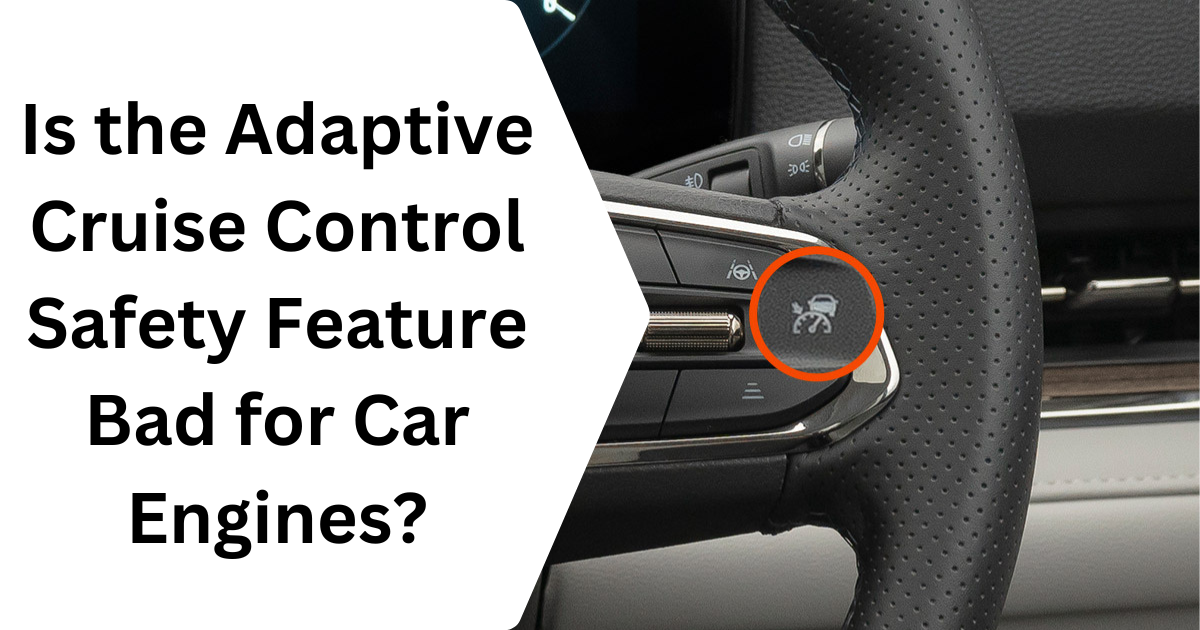Adaptive Cruise Control (ACC) is a feature found in many new cars that helps make driving easier and safer. It uses sensors to watch the road and automatically keeps a safe distance between your car and the one in front of you. This feature is helpful for many Nigerian drivers, especially on long trips or in heavy traffic, as it reduces the need to keep pressing the brake or gas pedal.
However, some people worry that ACC might not be completely good for car engines. Since ACC changes the car’s speed often, it could make the engine work harder than usual. This has raised questions about whether using ACC could cause more wear and tear on the engine over time. In this post, we’ll explore what ACC does, how it affects the engine, and if these worries are something you should think about.
What is Adaptive Cruise Control?
Adaptive Cruise Control (ACC) is an advanced feature in modern cars that helps drivers maintain a steady speed without constantly adjusting the accelerator. Unlike traditional cruise control, which only keeps the car at a set speed, ACC uses sensors to detect the distance between your car and the vehicle ahead. If the car in front slows down, ACC will automatically reduce your speed to maintain a safe following distance. Once the road clears, it gradually brings you back to your original speed, making the drive smoother and easier.
This feature is especially useful in traffic or on highways, as it can handle stop-and-go situations with less effort from the driver. For Nigerian drivers who often deal with traffic jams and crowded roads, ACC can help reduce the stress of frequent braking and accelerating. Some ACC systems can even bring the car to a complete stop and then resume driving when traffic starts moving again, making it even more convenient in busy areas.
However, it’s important to know that ACC is not a fully self-driving feature. While it helps with speed control, the driver still needs to stay alert and be ready to take control of the car at any moment. ACC is a great tool for making driving more comfortable and reducing fatigue. Still, it doesn’t replace the need for a focused driver who can handle unexpected situations on the road.
Is the Adaptive Cruise Control Feature Bad for Car Engines?
No, Adaptive Cruise Control (ACC) is not bad for car engines. In fact, this feature is designed to work safely within the car’s mechanical limits and is carefully tested by manufacturers to ensure it won’t harm the engine over time.
While ACC does make frequent adjustments to the car’s speed, these changes are gradual and controlled. The system is programmed to smoothly speed up or slow down as needed, which means the engine doesn’t experience sudden stress. This is different from how a driver might quickly accelerate or brake, which can be harder on the engine. By maintaining a steady and smooth driving pattern, ACC can actually reduce the amount of strain on the engine compared to manual driving in stop-and-go traffic.
The ACC is designed to operate within safe limits set by the car manufacturer, meaning it won’t push the engine beyond its capabilities. Engine and vehicle systems are built to handle a wide range of driving conditions, and ACC stays well within those ranges. Regular maintenance, such as oil changes and tune-ups, helps ensure that the engine remains in good condition, whether or not you use ACC. By keeping up with routine car care, ACC can be a helpful feature without causing any harm to the engine.
This feature can even help extend the engine’s lifespan by promoting a smoother, more efficient driving style. Since ACC reduces the need for constant braking and accelerating, it can improve fuel efficiency and reduce wear and tear on the car’s parts. This can lead to less stress on the engine and other systems, helping them last longer. So, instead of harming the engine, ACC can actually support better performance and prolong the overall life of your car.
Does ACC Impact Engine Lifespan?
No, Adaptive Cruise Control (ACC) doesn’t harm the engine’s lifespan. In fact, it can help the engine by promoting smoother and more consistent driving.
The ACC helps avoid sudden speed changes, like hard braking or quick acceleration, which can put stress on the engine. This smooth driving style is easier on the engine and can actually reduce the wear and tear caused by more aggressive driving.
ACC can also improve fuel efficiency by keeping the car at a steady speed whenever possible. When the engine doesn’t need to work as hard to keep up with sudden speed changes, it uses less fuel and experiences less strain. This can help keep the engine running well over time, as the engine parts don’t wear out as quickly from constant stopping and starting.
Finally, using ACC along with regular car maintenance can help the engine last longer. ACC is designed to work safely within the car’s limits, so as long as you keep up with oil changes and other routine services, it won’t overwork the engine. In fact, keeping up with car care and using ACC can make your engine last even longer.
What Are The Disadvantages Of Adaptive Cruise Control?
While Adaptive Cruise Control doesn’t harm your car’s engine, it does come with a few drawbacks worth considering. Let’s explore some of the disadvantages that come with relying on this advanced driving feature.
Limited Use in Heavy Traffic
Adaptive Cruise Control (ACC) can struggle in heavy or stop-and-go traffic. While it’s designed to adjust the car’s speed based on the vehicle ahead, ACC may not react quickly enough in constantly changing traffic conditions. For example, in bumper-to-bumper traffic, the system may not slow down as promptly as a driver would, leading to the need for manual control to avoid sudden stops. In these cases, relying on ACC can feel unreliable and may even cause stress if the system doesn’t respond as expected.
Not a Replacement for Full Driver Attention
Although ACC can make driving easier, it’s not a self-driving feature, and it requires the driver to stay alert at all times. The system may not detect all potential hazards, such as a car cutting into your lane suddenly or obstacles like road debris. ACC is not capable of handling every scenario on the road, and drivers need to be ready to take control in these moments. Relying too much on ACC can lead to a false sense of security, causing some drivers to pay less attention to their surroundings.
Some drivers may become overly reliant on ACC, especially on long trips. This can lead to “driver disengagement,” where the driver becomes less focused and slower to react if an emergency arises. ACC is a useful tool, but it doesn’t replace the need for a fully engaged driver who is actively watching the road and ready to take action if necessary.
Potential for Increased Maintenance Costs
ACC systems are made up of complex sensors and cameras, which can lead to higher maintenance costs over time. These parts are essential for the system to function properly, but they can wear out or malfunction. If a sensor gets damaged or dirty, it may not work as expected, which could require a repair. Depending on the car model, these repairs can be expensive and may not be covered by standard warranties.
In addition, ACC’s frequent adjustments to speed could lead to a slight increase in wear and tear on brakes and other mechanical components. While these effects are generally minor, drivers who frequently use ACC may notice a need for brake maintenance or replacements sooner than expected.
FAQS
What is an Adaptive Cruise Control Problem?
An adaptive cruise control (ACC) problem usually refers to issues with the system’s sensors or software, which can lead to inaccurate speed adjustments or unexpected braking. For instance, if the sensors become dirty or blocked, ACC may struggle to detect vehicles in front, causing it to react too slowly or not at all. Additionally, software glitches can result in the system disengaging unexpectedly, which can be inconvenient or even unsafe. Regular maintenance and keeping sensors clean can help prevent most of these issues.
Is Adaptive Cruise Control More Fuel Efficient?
Yes, adaptive cruise control can improve fuel efficiency by maintaining a steady speed and minimizing sudden acceleration and braking. When the car’s speed is kept consistent, it reduces the amount of fuel needed, especially on highways. However, the efficiency benefits may vary depending on traffic conditions and driving style. In stop-and-go traffic, ACC may not be as fuel-efficient due to frequent adjustments, but on open roads, it can help reduce overall fuel consumption.
Can You Turn Off Adaptive Cruise Control?
Yes, you can easily turn off adaptive cruise control. Most vehicles have a dedicated button or control on the steering wheel that allows drivers to activate or deactivate the system. You can also override ACC by pressing the brake pedal or accelerating manually, which temporarily disables the feature until you’re ready to re-engage it. Turning off ACC is helpful in situations where manual control is more comfortable, such as when driving in a city or in heavy traffic.
Where is the Sensor for Adaptive Cruise Control?
The sensor for adaptive cruise control is typically located on the front of the vehicle, often near the grille or bumper. Some cars have a combination of radar and camera sensors that work together to detect other vehicles on the road. These sensors must be kept clean and free of obstructions, as dirt, snow, or debris can interfere with their accuracy and may cause the ACC system to malfunction or turn off temporarily.
Should I Use Adaptive Cruise Control in the City?
It’s generally not recommended to use adaptive cruise control in the city, where traffic is often stop-and-go, and there are many unpredictable elements like pedestrians and cyclists. ACC works best on highways or open roads with fewer obstacles and less traffic. In city driving, you’re likely to need more control over the vehicle to navigate through traffic signals, intersections, and sudden stops, which makes manual driving safer and more practical in urban settings.




